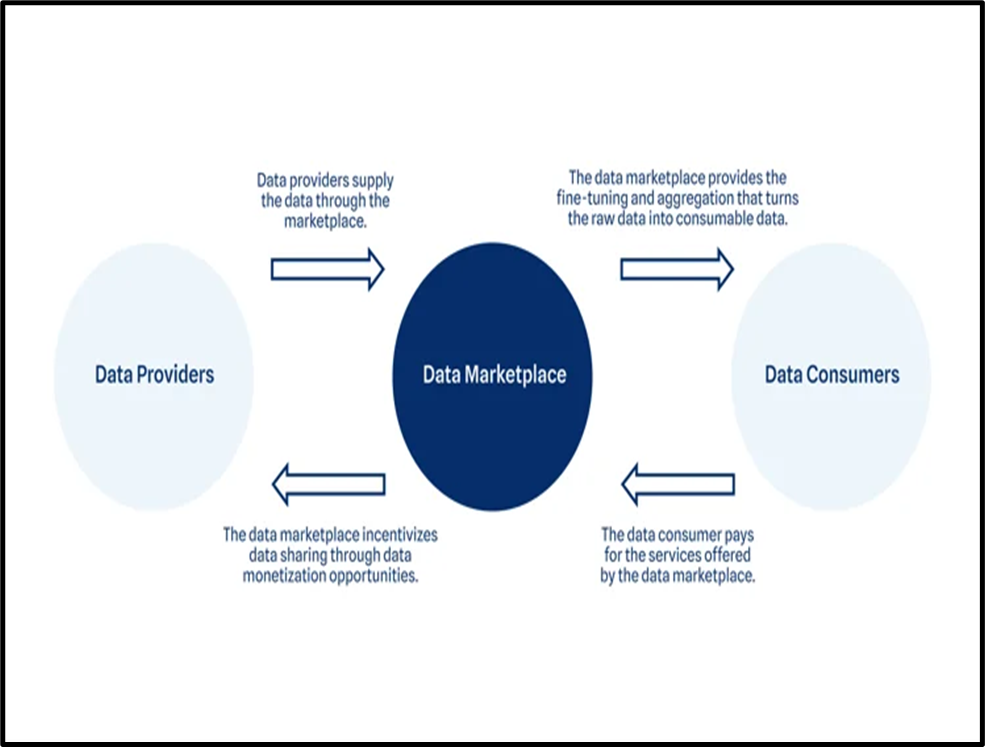DATA MARKETPLACES: THE NEXT FRONTIER
Syllabus:
GS 3:
- Indian Economy and issues
- Science and Technology- Developments and their Applications
GS 2: E-governance- applications.
Why in the news?
Data marketplaces and governance reforms spotlighted to harness data’s potential, addressing regulatory gaps and fostering economic growth.
source:thinkdata
Understanding The Significance of Data in India’s Economic Growth
- A NASSCOM report suggests that data and artificial intelligence (AI) could contribute significantly to India’s GDP by 2025.
- Role of Digitization in Economic Growth:
- Digitization is crucial for India’s goal of becoming a $5 trillion economy.
- Data and AI can potentially add $450-500 billion to India’s GDP by 2025.
| What is the National Association of Software and Services Companies (NASSCOM) ?
● National Association of Software and Services Companies (NASSCOM) is a non-profit industry association. ● It serves as the apex body for the IT industry in India. ● Established in 1988, NASSCOM is dedicated to supporting the IT and BPO sectors. ● Its members include Indian companies involved in software development, software services, and IT-enabled/BPO services. ● NASSCOM ensures service quality and enforces Intellectual Property Rights within the Indian software and BPO industry. Understanding Internet of Things (IoT): ● IoT comprises various devices, from sensors to smartphones and wearables. ● Devices in IoT can communicate with each other and with the internet. ● It enables communication across different networks, fostering a more connected world. About Internet Corporation for Assigned Names and Numbers (ICANN): ● Internet Corporation for Assigned Names and Numbers (ICANN) is a non-profit organisation. ● Established in 1988 by the US Department of Commerce, it administers domain names and IP addresses globally. ● It ensures computers can find each other on the internet through unique identifiers. ● Became independent of US control in 2016. |
About Citizen data includes Personal Data (PD) :
- Government digitization efforts lead to the accumulation of increasing volumes of citizen data.
- Citizen data includes Personal Data (PD) and Non-Personal Data (NPD), with NPD holding the potential to serve as a public good.
- Integration of Non-Personal Data in Public Services
- Advocates suggest integrating NPD into public service delivery to enhance scalability and develop solutions for societal and economic challenges.
- Advanced analytics and AI applications on NPD can predict favourable outcomes in various sectors.
Understanding Non-Personal Data (NPD):
- Integration of NPD in Public Services:
- Advocated for creating synergies and scalable solutions in public service delivery.
- Application of advanced analytics and AI to NPD can predict socially and economically sound outcomes.
- Challenges with NPD Regulation:
- Stark absence of regulation for NPD compared to PD.
- Efforts at the executive level but lacking comprehensive regulation.
- NPD Governance Framework:
- The Kris Gopalakrishnan-led committee addressed issues like de-anonymization risk and data sharing mechanisms.
- MeitY released the National Data Governance Framework Policy to address gaps.
- Reforms Needed:
- Designing regulatory frameworks to regulate NPD and facilitate data exchanges.
- Creating scalable data exchange ecosystems to deploy advanced analytics.
- Addressing privacy concerns and ensuring stakeholder rights and obligations.
- Examples from Other Countries:
- Australia, UK, and Estonia have adopted data exchange frameworks for various sectors.
- India’s initiatives include Telangana’s agriculture data exchange and India Urban Data Exchange by the Ministry of Housing & Urban Affairs.
- Gaps in NPD Framework:
- Lack of tangible guidance for achieving abstract principles.
- Overlooking operationalization and stakeholder rights.
- Absence of standardised governance tools and mechanisms for data pricing and exchange.
About the Initiatives in India:
- States like Telangana have established sector-specific data exchanges, while the central government has initiated projects like the India Urban Data Exchange.
- However, a comprehensive blueprint for governing data exchanges is lacking.
- Gaps in the National Data Governance Framework.
- The NPD Framework in India lacks actionable guidance, leaving questions regarding stakeholder rights, pricing of data, and legal structures unanswered.
- Standardised governance tools and operationalization mechanisms are necessary to address these challenges.
Challenges:
Digital Exclusion:
- Risk of exacerbating the digital divide, with many still lacking internet access.
- Potential for frontier technologies to benefit only certain segments, leaving the poorest behind.
Uncertain Future of Work:
- Automation threatens the jobs of millions, particularly in the Asia-Pacific region.
- Concerns about job displacement and the need for reskilling and up-skilling
Challenges in Non-Personal Data Regulation:
- Unlike Personal Data, NPD lacks comprehensive regulation.
- Regulating NPD exchanges across sectors is essential to ensure data privacy, facilitate inter-sectoral integration, and mitigate administrative burden.
Trust and Ethical Questions:
- Ethical dilemmas regarding privacy, data ownership, and transparency.
- Governance complexities amid global population growth and diverse cultural contexts.
Way forward :
- Agriculture: Enhancing productivity, precision farming, and sustainable practices.
- Manufacturing: Revolutionising production processes, customization, and efficiency.
- Services: Facilitating trade, digital platforms, and bridging formal and informal sectors.
- Governance: Improving public administration, service delivery, and transparency.
- Environment: Mitigating climate hazards, pollution, and promoting eco-friendly
- Smart Cities: Songdo, South Korea, exemplifies IoT integration for traffic management, energy efficiency, and environmental sustainability.
- Sustainable Development: Aligning technological advancements with societal and environmental goals outlined in the 2030 Agenda.
Conclusion:
Provide actionable guidance to achieve NPD governance objectives.Formulating a robust regulatory framework for governing data exchanges in India is imperative.This framework should provide actionable pathways, standardised tools, and mechanisms for operationalization, aligning with global best practices.Author’s Affiliation Jyotsana Singh, a research fellow at the Vidhi Centre for Legal Policy, specialises in applied law and technology and Fintech verticals.
Source: The Hindu
Mains Practice Question:
Discuss the emergence of data marketplaces as the next frontier in the context of India’s digitization drive and the challenges associated with the governance of non-personal data (NPD). How can India formulate a policy framework to address the gaps in NPD governance and ensure inclusivity and transparency in data exchanges?




